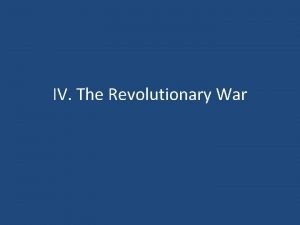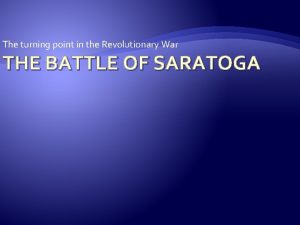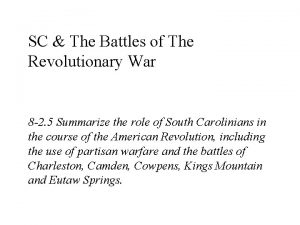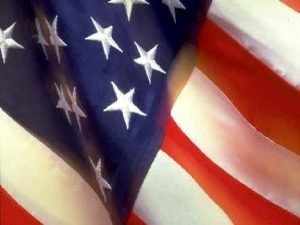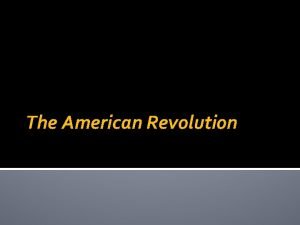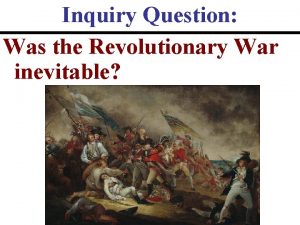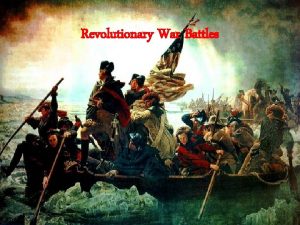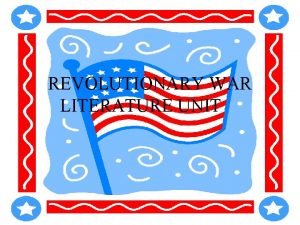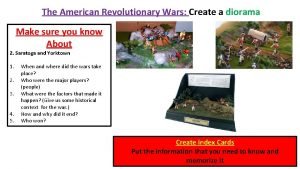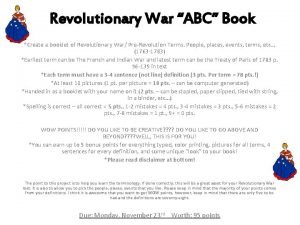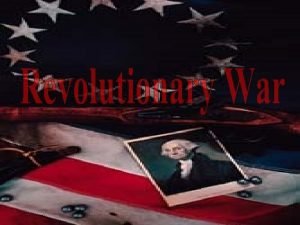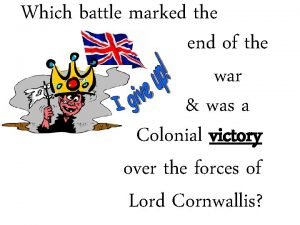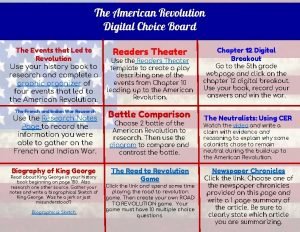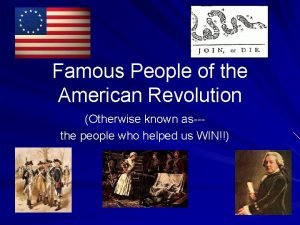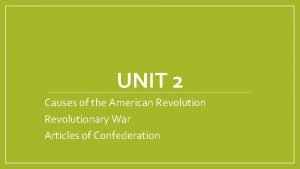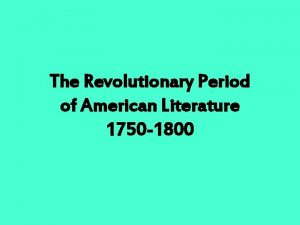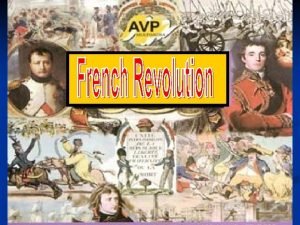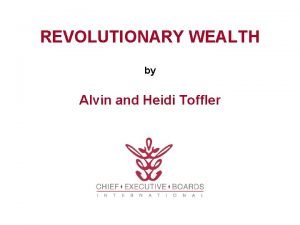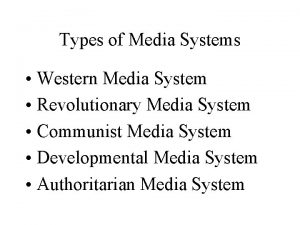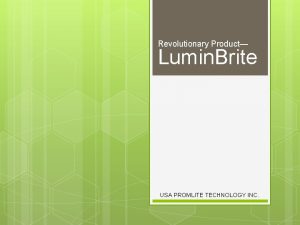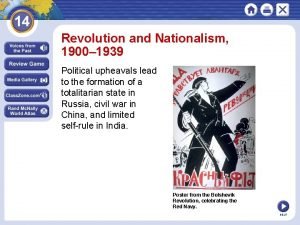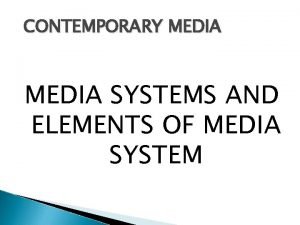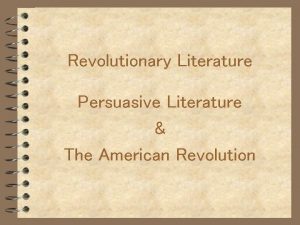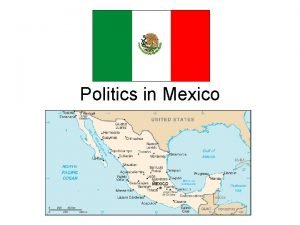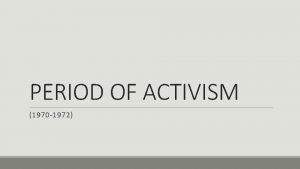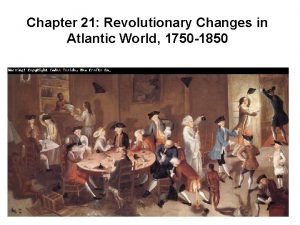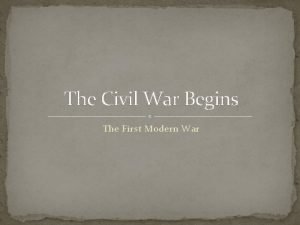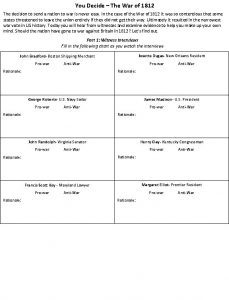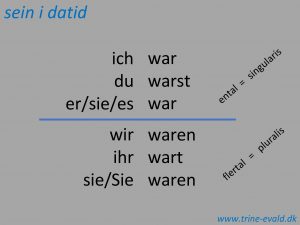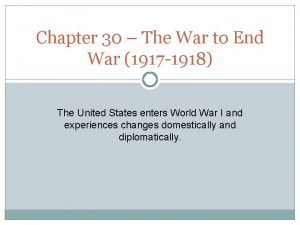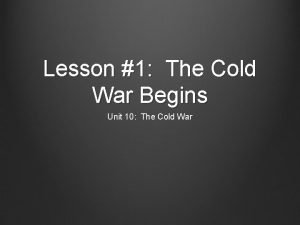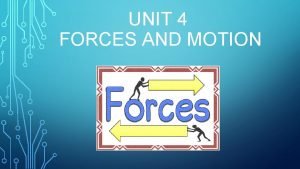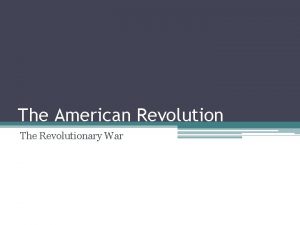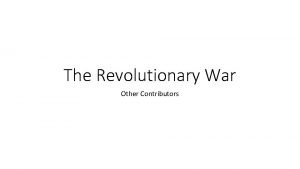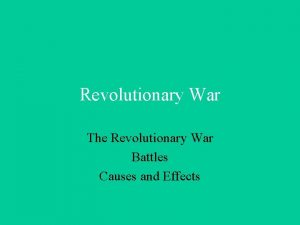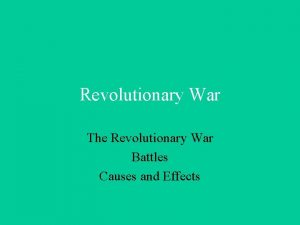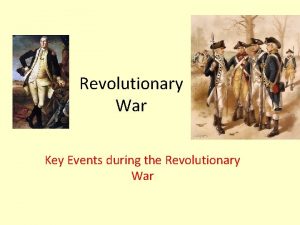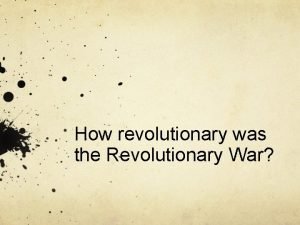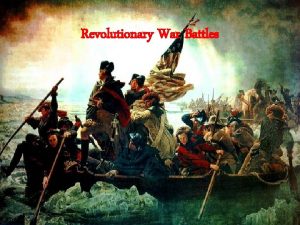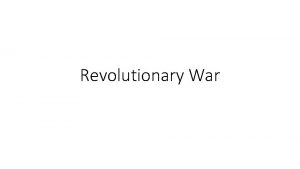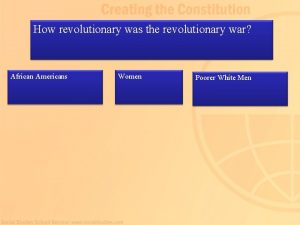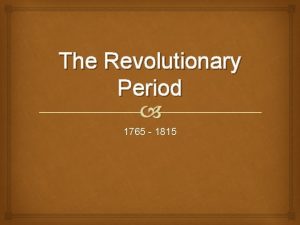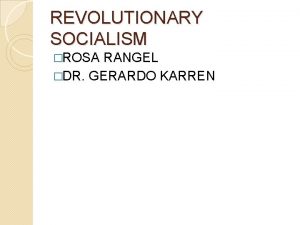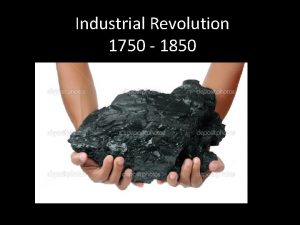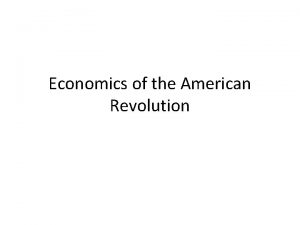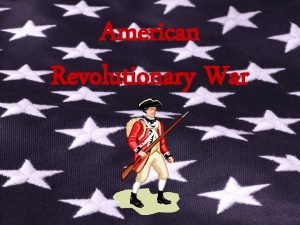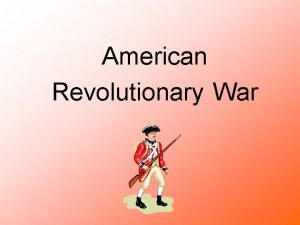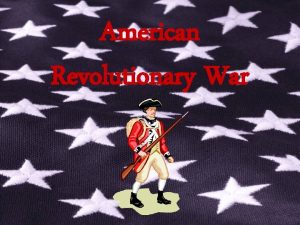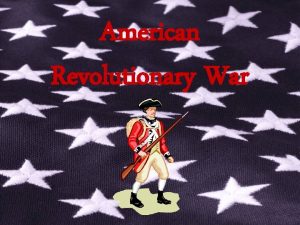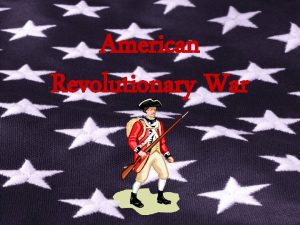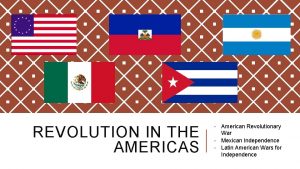From Revolution to Revolution The Revolutionary war to











































- Slides: 43

From Revolution to Revolution The Revolutionary war to the Industrial Revolution

After the War, Washington was a HERO • Excellent Leader • 1 st President of New Nation 1775 -1799 • Humble • United ALL factions= ___________ • Upon leaving office gave his famous “Farewell Address, ” issuing advice and humility • It can be broken down into 11 parts…

Side Note… • Article _____ of the Constitution deals with the Executive branch • When the founders wrote the Constitution they had Washington in mind as the president… • How does that effect the enumerated powers that the founders granted the President?

Washington’s Farewell Address 1796 1. The Importance of Unity, and The Danger of Sectionalism 2. The Authority of the Constitution, the Threat of Political Factions, and the Danger of Constitutional Amendments Designed to Weaken the Government 3. The Dangers of Political Parties 4. The Importance of the Constitution's System of Checks and Balances, Separation of Powers, and Constitutional Amendments 5. Religion, Morality, and Education 6. The Importance of Credit, and the Sparing Use of Government Borrowing 7. Foreign Relations, the Dangers of Permanent Foreign Alliances, and Free Trade 8. Washington's Intentions in Writing This Letter 9. Defense of the Proclamation of Neutrality 10. Closing Thoughts 11. Legacy

1. The Importance of Unity, and The Danger of Sectionalism 2. The Authority of the Constitution, the Threat of Political Factions, and the Danger of Constitutional Amendments Designed to Weaken the Government

3. The Dangers of Political Parties 4. The Importance of the Constitution's System of Checks and Balances, Separation of Powers, and Constitutional Amendments

Remember Washington’s Words • “The great rule of conduct for us in regard to foreign nations is in extending our commercial relations, to have with them as little political connection as possible…. It is our true policy to steer clear of permanent alliances with any portion of the foreign world; so far, I mean, as we are now at liberty to do it; … Taking care always to keep ourselves by suitable establishments on a respectable defensive posture, we may safely trust to temporary alliances for extraordinary emergencies. ”

Alien Sedition Acts 1798 Four separate laws constituted what is commonly referred to as the "Alien and Sedition Acts“ 1. 2. 3. 4. The Naturalization Act -Extended the duration of residence required for aliens to become citizens of the United States from five years to fourteen years. The Alien Act - Authorized the president to deport any resident alien considered "dangerous to the peace and safety of the United States. " It was activated June 25, 1798, with a two year expiration date. The Alien Enemies Act -Authorized the president to apprehend and deport resident aliens if their home countries were at war with the United States of America. Enacted July 6, 1798, and providing no sunset provision, the act remains intact today. At the time, war was considered likely between the U. S. and France. The Sedition Act - Made it a crime to publish "false, scandalous, and malicious writing" against the government or its officials. It was enacted July 14, 1798, with an expiration date of March 3, 1801 (the day before Adams' presidential term was to end).

STOP AND THINK • Who do these Acts give A LOT OF POWER?

Who Are These 2 Parties? Federalist Republicans (aka Democratic- Republicans) • Alexander Hamilton • Thomas Jefferson and James Madison • Believed in STRONG central government • Believed in SMALL central government • IMPLIED POWERS • ENUMERATED POWERS

Nationalism, Federalism, and Sectionalism • Nationalism= • Federalism= • Sectionalism=

America’s First Test as a New Country • Britain and France go to war in 1803. They attack American ships because neither side wants the other to be helped by American trade This deepens the divide between the Federalists and Republicans

STOP AND THINK… why would this deepen the divide between the Federalists and Republicans?

War of 1812 • Fought between America and Great Britain • Fought in Canada, and America • Fought on Land at Sea! • America… Wins! • Peace Treaty of Ghent

Leading Up to the War of the 1812 • Embargo Act of 1807 Congress passes the act which prohibits trade with ANY foreign country. • The Act does not hurt Britain or France; just New England merchants. • Britain and France keep attacking ships.

Leading Up to the War of the 1812 • Congress repeals the Embargo Act of 1809 and passes a new law, which promises that the U. S. will trade with the first country to stop violating American neutrality. • France stops, America begins trade… England gets mad!!

Causes • Trade restrictions • Imprisonment of US soldiers by British Ships • Angriness regarding America trading with France • Supplying Native Americans with Weapons Effects • American settlers on the frontier were safer from Indian attack • American industry grew as Americans were forced to make goods they used to get from Britain • Trade increased • America proved it was able to protect itself.

Monroe Doctrine 1823 • Neutrality= ___________________ • Monroe Doctrine: issued in 1823, telling the world to leave the US and the entire Western hemisphere alone

But in a Growing World, Is Neutrality Possible?

The Industrial Revolution in America

Technology • In the period between the Revolutionary War and the Civil War, the United States grew in the areas of industry and technology. • Can you think of an examples of technology that we use in the United States now? – Think of as many modern examples of technology as you can…

STOP AND THINK

The Industrial Revolution • The growth in technology in the 1800’s was know as the Industrial Revolution.

• The Industrial Revolution was a sudden radical change in the way goods were produced, farm products were grown, and people and goods were transported.

• There were a number of important developments in America during the Industrial Revolution.

The Cotton Gin • Made in 1794 by Eli Whitney, the Cotton Gin separated seeds from cotton. • This used to require a lot of work but was helped by the cotton gin.

STOP AND THINK

The Lowell Mills • Beginning in 1821, The Lowell Mills were some of the first “factories” in America. • Their workers were young women who spun and weaved yarn. • The factories were powered by mills on a large river.

The Lowell Mills

STOP AND THINK

The Mechanical Reaper • The first Mechanical Reaper in the United States was invented by Robert Hall Mc. Cormick in Virginia. • It made it much easier to harvest grains.

STOP AND THINK

The National Road • The National Road was the first major federal highway. It began being built in 1811. • It allowed transport from the east coast to the middle of the country.

STOP AND THINK

The National Road

The Erie Canal • The Erie Canal opened in 1825. It was 363 miles long and allowed ships to travel from the Atlantic Ocean to the Great Lakes. • It made it much easier for people and goods to travel from the east to the middle of the country.

The Erie Canal

STOP AND THINK

Steam Trains • The first steam train was made in 1794. It was maybe the most important invention of the Industrial Revolution.

Steam Trains • Trains allowed people and goods to move quickly to the center of the country. This would allow our country to grow and eventually reach the Pacific Coast.

STOP AND THINK

The Industrial Revolution • The technology of the Industrial Revolution allowed for our country to make a lot of money. This happened through inventions like the Cotton Gin and the Mechanical Reaper. • It would also allow for our country to expand. This happened through inventions like the Erie Canal, The National Road, and Steam Trains.

STOP AND THINK
 Warchap
Warchap British weaknesses in the revolutionary war
British weaknesses in the revolutionary war Turning point of the revolutionary war
Turning point of the revolutionary war Kings mountain battle map
Kings mountain battle map Revolutionary war jeopardy
Revolutionary war jeopardy Music of the revolutionary war
Music of the revolutionary war What were the british strengths and weaknesses
What were the british strengths and weaknesses Swampfox mohawk
Swampfox mohawk Was the revolutionary war inevitable
Was the revolutionary war inevitable Map of the battle of fort ticonderoga
Map of the battle of fort ticonderoga Revolutionary war literature
Revolutionary war literature Revolutionary war interactive notebook
Revolutionary war interactive notebook Revolutionary war diorama
Revolutionary war diorama Famous virginians
Famous virginians Abc revolutionary war
Abc revolutionary war King of england during revolutionary war
King of england during revolutionary war British strengths during the revolutionary war
British strengths during the revolutionary war Which battle
Which battle American revolution digital breakout answers
American revolution digital breakout answers American revolt
American revolt Causes of the american revolutionary war
Causes of the american revolutionary war American literature 1750 to 1800
American literature 1750 to 1800 The enlightenment influenced revolutionary thought by
The enlightenment influenced revolutionary thought by Revolutionary princess eve chapter 5
Revolutionary princess eve chapter 5 Revolutionary wealth
Revolutionary wealth Revolutionary media system
Revolutionary media system Revolutionary product
Revolutionary product Revolutionary leaders 1900-1939
Revolutionary leaders 1900-1939 What is media systems
What is media systems American revolutionary literature
American revolutionary literature Institutional revolutionary party
Institutional revolutionary party It is the result of activism in 1972
It is the result of activism in 1972 Chapter 21 revolutionary changes in the atlantic world
Chapter 21 revolutionary changes in the atlantic world Civil war first modern war
Civil war first modern war War at home vs war abroad madison
War at home vs war abroad madison Chapter 30 the war to end war
Chapter 30 the war to end war Josette dugas
Josette dugas Perfect lizz
Perfect lizz Korean war vietnam war venn diagram
Korean war vietnam war venn diagram Sein remse
Sein remse Toward civil war lesson 3 secession and war
Toward civil war lesson 3 secession and war Chapter 30 the war to end war
Chapter 30 the war to end war The cold war begins lesson 1
The cold war begins lesson 1 Force and motion study jams
Force and motion study jams

